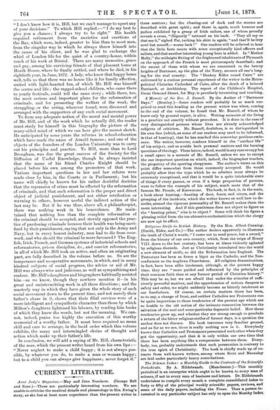prised to read this heading as the present writer was
when, coming to the end of the volume, be found that Mr. Russell, of whom he knew only by general report, is alive. Writing memoirs of the living is a practice not exactly without precedent. It is done in the case of very distinguished persons whose lives are already acknowledged subjects of criticism. Mr. Russell, doubtless, is so distinguished in his own line (which, as some of our readers may need to be informed, is that of hunting), that he has reached this somewhat perilous emin- ence. The writer, however, confines himself to the "outdoor life" of his subject, and so avoids both personal matters and the burning questions of theology. These latter, indeed, would in any case occupy but a small space in a memoir of Mr. Russell, unless we are to except the one important question on which, indeed, the biographer touches, the propriety of the sporting clergyman. The author's views on this point differ somewhat from those commonly accepted. Be would probably allow that the type which be so admires must always be extremely exceptional, and that it would be a quite intolerable state of things if every parson, or even if a large proportion of parsons, were to follow the example of his subject, much more that of the famous Mr. Fronde, of Knowstone. The book, in fact, is, in the main, a book about bunting,—hunting of deer, foxes, and otters, and the grouping of the incidents, which the writer knows so well how to de- scribe, around the vigorous personality of Mr. Russell makes them the more interesting. And if this gentleman does not object to figure as the "hunting priest," who is to object ? Some will think his figure a pleasing relief from the too obtrusive ecclesiasticism which the clergy are now apt to affect.


































 Previous page
Previous page